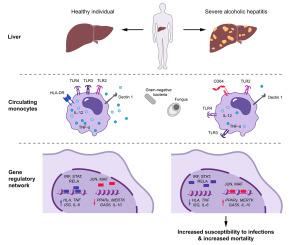当前位置:
X-MOL 学术
›
J. Hepatol.
›
论文详情
Our official English website, www.x-mol.net, welcomes your
feedback! (Note: you will need to create a separate account there.)
Epigenetic basis for monocyte dysfunction in patients with severe alcoholic hepatitis
Journal of Hepatology ( IF 26.8 ) Pub Date : 2020-08-01 , DOI: 10.1016/j.jhep.2020.02.017 Laura Weichselbaum 1 , Abdulkader Azouz 2 , Kinga K Smolen 2 , Jishnu Das 3 , Marion Splittgerber 2 , Antonia Lepida 4 , Christophe Moreno 5 , Jonas Schreiber 4 , Thomas Sersté 6 , Eric Trepo 5 , Frederick Libert 7 , Thierry Gustot 8 , Stanislas Goriely 2
Journal of Hepatology ( IF 26.8 ) Pub Date : 2020-08-01 , DOI: 10.1016/j.jhep.2020.02.017 Laura Weichselbaum 1 , Abdulkader Azouz 2 , Kinga K Smolen 2 , Jishnu Das 3 , Marion Splittgerber 2 , Antonia Lepida 4 , Christophe Moreno 5 , Jonas Schreiber 4 , Thomas Sersté 6 , Eric Trepo 5 , Frederick Libert 7 , Thierry Gustot 8 , Stanislas Goriely 2
Affiliation

|
BACKGROUND & AIMS
Severe forms of alcohol-related liver disease are associated with increased susceptibility to infections contributing to their poor prognosis. The cellular and molecular mechanisms responsible for this altered host defense are incompletely understood. METHODS
We performed whole blood phenotypic analysis and ex vivo stimulation with various pathogen-associated molecular patterns (PAMPs). We included 34 patients with alcohol-related cirrhosis (18 of which had biopsy-proven severe alcoholic hepatitis [sAH]), 12 healthy controls and 11 patients with chronic alcohol consumption without significant liver disease. We also evaluated the transcriptomic (RNA-seq) and chromatin accessibility (ATAC-seq) profiles of CD14+ monocytes from a subset of patients. RESULTS
Circulating monocytes and conventional dendritic cells (DCs) from patients with sAH displayed complex alterations characterized by increase of activation and inhibitory surface markers and impaired pro-inflammatory response upon stimulation with PAMPs representative of gram-negative bacteria (LPS, Pam3CSK4) or fungal pathogens (Zymosan). Their decreased ability to produce more than one cytokine (polyfunctionality) upon PAMPs stimulation was correlated with the risk of developing infection at 28 days or of mortality at 90 days. The presence of Acute-on-Chronic Liver Failure (ACLF) in patients with sAH did not significantly modify the immune profile of monocytes and DCs. Moreover, CD14+ monocytes of patients with sAH displayed altered transcriptional and epigenomic profiles characterized by downregulation of key innate immune and metabolic pathways and upregulation of important immunomodulatory factors. CONCLUSIONS
The altered transcriptional program and functional properties of monocytes from sAH patients contributing to their susceptibility to infection have strong epigenetic determinants.
中文翻译:

重度酒精性肝炎患者单核细胞功能障碍的表观遗传基础
背景和目的 严重形式的酒精相关肝病与感染的易感性增加有关,导致其预后不良。负责这种改变的宿主防御的细胞和分子机制尚不完全清楚。方法我们使用各种病原体相关分子模式 (PAMP) 进行了全血表型分析和体外刺激。我们纳入了 34 名酒精相关性肝硬化患者(其中 18 名患有活检证实为严重酒精性肝炎 [sAH])、12 名健康对照者和 11 名慢性饮酒患者,但没有明显的肝病。我们还评估了一部分患者的 CD14+ 单核细胞的转录组学 (RNA-seq) 和染色质可及性 (ATAC-seq) 谱。结果 来自 sAH 患者的循环单核细胞和常规树突状细胞 (DC) 表现出复杂的改变,其特征是在用代表革兰氏阴性菌(LPS、Pam3CSK4)或真菌病原体的 PAMP 刺激后,活化和抑制性表面标志物增加以及促炎反应受损(酵母聚糖)。它们在 PAMP 刺激下产生一种以上细胞因子(多功能性)的能力下降与 28 天时发生感染或 90 天时发生死亡的风险相关。sAH 患者中急性慢性肝衰竭 (ACLF) 的存在并未显着改变单核细胞和 DC 的免疫特征。而且,sAH 患者的 CD14+ 单核细胞显示出改变的转录和表观基因组特征,其特征是关键先天免疫和代谢途径的下调以及重要免疫调节因子的上调。结论 sAH 患者单核细胞转录程序和功能特性的改变导致他们对感染的易感性具有很强的表观遗传决定因素。
更新日期:2020-08-01
中文翻译:

重度酒精性肝炎患者单核细胞功能障碍的表观遗传基础
背景和目的 严重形式的酒精相关肝病与感染的易感性增加有关,导致其预后不良。负责这种改变的宿主防御的细胞和分子机制尚不完全清楚。方法我们使用各种病原体相关分子模式 (PAMP) 进行了全血表型分析和体外刺激。我们纳入了 34 名酒精相关性肝硬化患者(其中 18 名患有活检证实为严重酒精性肝炎 [sAH])、12 名健康对照者和 11 名慢性饮酒患者,但没有明显的肝病。我们还评估了一部分患者的 CD14+ 单核细胞的转录组学 (RNA-seq) 和染色质可及性 (ATAC-seq) 谱。结果 来自 sAH 患者的循环单核细胞和常规树突状细胞 (DC) 表现出复杂的改变,其特征是在用代表革兰氏阴性菌(LPS、Pam3CSK4)或真菌病原体的 PAMP 刺激后,活化和抑制性表面标志物增加以及促炎反应受损(酵母聚糖)。它们在 PAMP 刺激下产生一种以上细胞因子(多功能性)的能力下降与 28 天时发生感染或 90 天时发生死亡的风险相关。sAH 患者中急性慢性肝衰竭 (ACLF) 的存在并未显着改变单核细胞和 DC 的免疫特征。而且,sAH 患者的 CD14+ 单核细胞显示出改变的转录和表观基因组特征,其特征是关键先天免疫和代谢途径的下调以及重要免疫调节因子的上调。结论 sAH 患者单核细胞转录程序和功能特性的改变导致他们对感染的易感性具有很强的表观遗传决定因素。









































 京公网安备 11010802027423号
京公网安备 11010802027423号